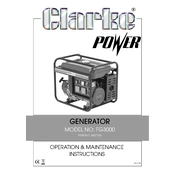Clarke 8857700 FG3000 Instructions


To start the Clarke 8857700 FG3000 Generator, first ensure the fuel valve is open. Set the choke lever to the "closed" position if the engine is cold. Turn the engine switch to the "on" position, then pull the recoil starter handle gently until resistance is felt, then pull briskly. Once the engine starts, gradually move the choke lever to the "open" position.
The Clarke 8857700 FG3000 Generator is designed to run on unleaded gasoline with an octane rating of 87 or higher. Ensure the fuel is fresh and free from contaminants.
It is recommended to change the oil after the first 20 hours of operation, and subsequently every 50 hours or annually, whichever comes first. Use SAE 10W-30 oil for optimal performance.
To store the Clarke 8857700 FG3000 Generator, drain the fuel tank and carburetor to prevent stale fuel issues. Clean the exterior and store it in a dry, well-ventilated area. Cover the generator to protect it from dust and moisture.
If the generator is running but not producing power, check the circuit breaker and reset if necessary. Inspect the connections and ensure all cords are properly plugged in. If the problem persists, the alternator may need servicing.
To reduce noise, place the generator on a flat, stable surface and consider using a soundproof enclosure. Regular maintenance, such as tightening loose parts and ensuring the exhaust system is intact, also helps in noise reduction.
If the generator is hard to start, check the spark plug for wear or damage and replace if necessary. Ensure the fuel is fresh and the air filter is clean. Additionally, verify that the choke is in the correct position for starting.
Running the generator in wet conditions is not safe as it may lead to electric shock or generator damage. Use it in a dry, covered area with adequate ventilation to prevent water ingress.
Routine maintenance includes changing the oil, inspecting the air filter, checking spark plugs, and cleaning the fuel system. Refer to the user manual for detailed instructions on each maintenance task.
Common causes of engine overheating include overloading, inadequate ventilation, and low oil levels. Ensure the generator is not overloaded, positioned in a well-ventilated area, and that oil levels are adequate.